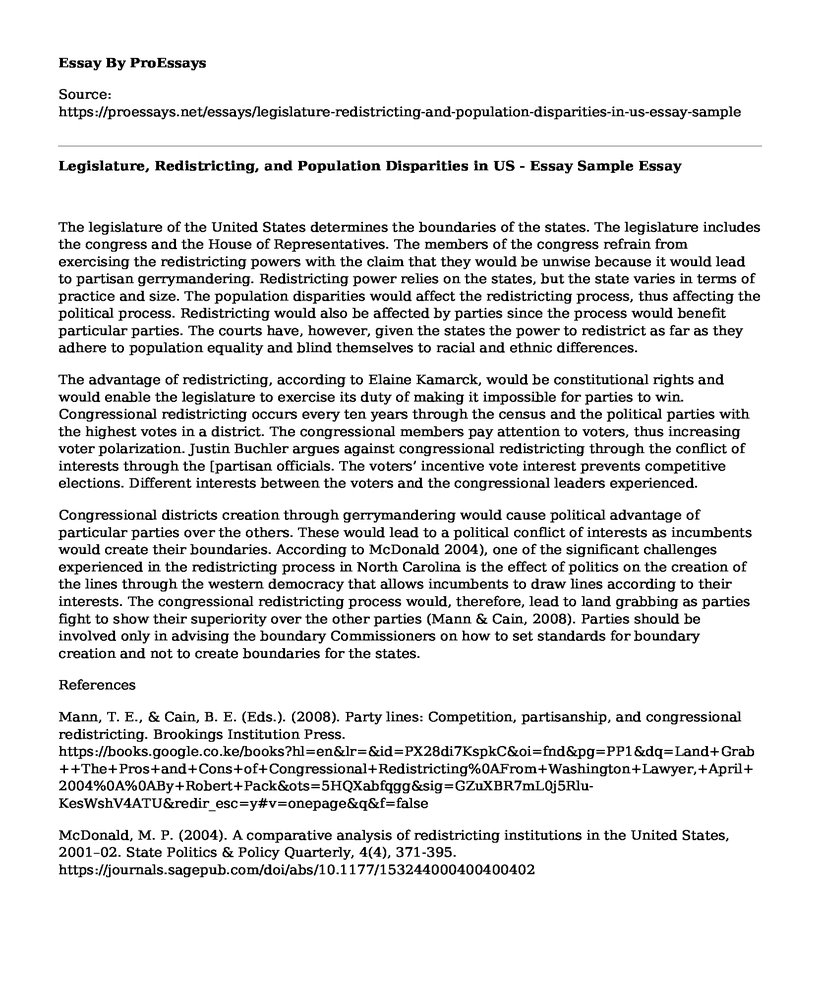The legislature of the United States determines the boundaries of the states. The legislature includes the congress and the House of Representatives. The members of the congress refrain from exercising the redistricting powers with the claim that they would be unwise because it would lead to partisan gerrymandering. Redistricting power relies on the states, but the state varies in terms of practice and size. The population disparities would affect the redistricting process, thus affecting the political process. Redistricting would also be affected by parties since the process would benefit particular parties. The courts have, however, given the states the power to redistrict as far as they adhere to population equality and blind themselves to racial and ethnic differences.
The advantage of redistricting, according to Elaine Kamarck, would be constitutional rights and would enable the legislature to exercise its duty of making it impossible for parties to win. Congressional redistricting occurs every ten years through the census and the political parties with the highest votes in a district. The congressional members pay attention to voters, thus increasing voter polarization. Justin Buchler argues against congressional redistricting through the conflict of interests through the [partisan officials. The voters' incentive vote interest prevents competitive elections. Different interests between the voters and the congressional leaders experienced.
Congressional districts creation through gerrymandering would cause political advantage of particular parties over the others. These would lead to a political conflict of interests as incumbents would create their boundaries. According to McDonald 2004), one of the significant challenges experienced in the redistricting process in North Carolina is the effect of politics on the creation of the lines through the western democracy that allows incumbents to draw lines according to their interests. The congressional redistricting process would, therefore, lead to land grabbing as parties fight to show their superiority over the other parties (Mann & Cain, 2008). Parties should be involved only in advising the boundary Commissioners on how to set standards for boundary creation and not to create boundaries for the states.
References
Mann, T. E., & Cain, B. E. (Eds.). (2008). Party lines: Competition, partisanship, and congressional redistricting. Brookings Institution Press. https://books.google.co.ke/books?hl=en&lr=&id=PX28di7KspkC&oi=fnd&pg=PP1&dq=Land+Grab++The+Pros+and+Cons+of+Congressional+Redistricting%0AFrom+Washington+Lawyer,+April+2004%0A%0ABy+Robert+Pack&ots=5HQXabfqgg&sig=GZuXBR7mL0j5Rlu-KesWshV4ATU&redir_esc=y#v=onepage&q&f=false
McDonald, M. P. (2004). A comparative analysis of redistricting institutions in the United States, 2001-02. State Politics & Policy Quarterly, 4(4), 371-395. https://journals.sagepub.com/doi/abs/10.1177/153244000400400402
Cite this page
Legislature, Redistricting, and Population Disparities in US - Essay Sample. (2023, Aug 14). Retrieved from https://proessays.net/essays/legislature-redistricting-and-population-disparities-in-us-essay-sample
If you are the original author of this essay and no longer wish to have it published on the ProEssays website, please click below to request its removal:
- McKinney-Vento Act Policy Essay
- History of Mexico and Anglo Expansion Essays
- President Franklin D. Roosevelt Policies Effect During the Great Depression Essay
- Why Universal Health Care Is Important - Essay Sample
- Essay Sample on US Government Upgrade of K-12 System: 3 Factors Needed
- 1906 Pure Food and Drug Act: The First Step in USA Drug Laws Enforcement - Essay Sample
- Essay Example on Eisenhower & Kennedy: Protecting Civil Rights for African Americans







